综合英语教程1_Unit2_part1
全新版大学英语综合教程1Unit2练习题及其答案
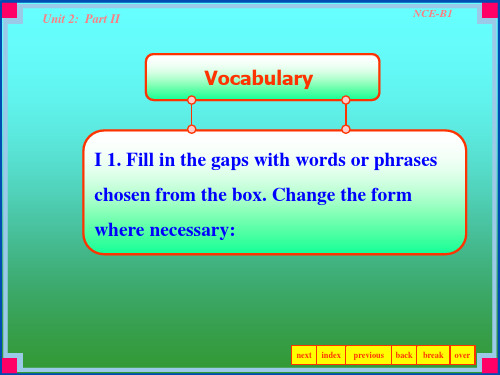
• available go ahead keep in touch • absolutely urge estimate reunion • hang out destination or something • go by every now and then mostly • know by heart right away reference
next index previous back break over
Unit 2: Part II
NCE-B1
1) He seemed to be still anxious about his failure in the examination. (on one’s mind)
It seemed that his failure _i_n_t_h_e__e_x_a_m_i_n_a_t_io_n__w_a_s_s_t_il_l_o_n___ _h_i_s _m__in_d_.___________________________________________.
next index back previous break over
Unit 2: Part II
NCE-B1
4) I am afraid I won’t be able to accomplish the project on time because something has unexpectedly happened.(come up)
最新版新起点大学英语综合教程第一册unit2教案

Unit 2Section A: The Opera SingerTeaching Objectives:1. 理解课文A 和B 的文章大意,学习音乐家不懈努力追求完美艺术的高尚精神。
2. 理解和正确运用重点词汇、短语、主谓宾补句型、被动语态和疑问句。
3. 掌握两个易混淆元音/e/ 和/ æ/ 的不同发音。
4. 学会正确使用名词。
5. 了解乐曲《高山流水》的由来,学习古人珍惜友谊的高尚情操。
Teaching Procedures:Part 1: Warm-up Activities1. Matching:Learn the following words about different kinds of musical instrument, and match them to the pictures.2. Listen to the conversation. Then practice with your partner, using the words and phrases provided on the right.Part 2: Text A: The Opera SingerⅠ. Background Information1. Pedro Pablo SacristanPedro Pablo Sacristan (1973– ), was born in Madrid. He was the second of six children and studied at the private school where his father worked as an athletic trainer. Despite being part of a very modest family, he had a good education in an atmosphere of deep Christian roots. Bedtime Stories is a project that combines his great love for writing stories, a disguised vocation for education and deep knowledge in the fields of technology.2. History of operaOpera, whose name comes from the Italian word work, is an art form in which singers and musicians perform a dramatic work combining text and musical score, usually in a theatrical setting. Opera is part of the Western classical music tradition. It started in Italy at the end of the 16th century and soon spread throughout the rest of Europe.Ⅱ. Words and phrases1. mattera. v. be important 有关系;要紧What does it matter whether he comes or goes? 他是来是去,又有什么关系呢?b. n. affair, topic or situation being considered 事情;问题;情况It’s no laughing matter. 这可不是闹着玩的。
英语综合教程1
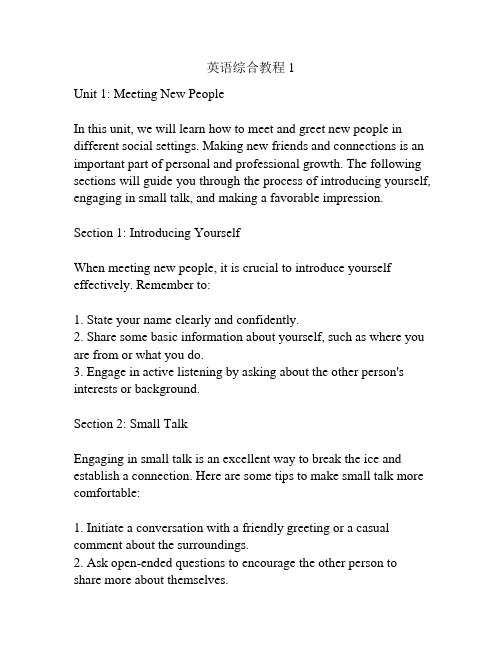
英语综合教程1Unit 1: Meeting New PeopleIn this unit, we will learn how to meet and greet new people in different social settings. Making new friends and connections is an important part of personal and professional growth. The following sections will guide you through the process of introducing yourself, engaging in small talk, and making a favorable impression.Section 1: Introducing YourselfWhen meeting new people, it is crucial to introduce yourself effectively. Remember to:1. State your name clearly and confidently.2. Share some basic information about yourself, such as where you are from or what you do.3. Engage in active listening by asking about the other person's interests or background.Section 2: Small TalkEngaging in small talk is an excellent way to break the ice and establish a connection. Here are some tips to make small talk more comfortable:1. Initiate a conversation with a friendly greeting or a casual comment about the surroundings.2. Ask open-ended questions to encourage the other person to share more about themselves.3. Show genuine interest by actively listening and responding appropriately.Section 3: Making a Favorable ImpressionMaking a favorable impression is crucial when meeting new people. Here are some strategies to consider:1. Maintain eye contact and have an open and friendly body language.2. Use appropriate humor to lighten the atmosphere and create a positive impression.3. Be a good listener and show empathy towards others.Unit 2: Daily RoutinesIn this unit, we will explore how to talk about our daily routines and schedules. Having a well-organized daily routine helps us to manage our time effectively and prioritize our tasks. Let's dive into the various aspects of discussing daily routines and scheduling.Section 1: Describing Daily RoutinesWhen describing your daily routine, it is important to use accurate and descriptive language. Some points to remember include:1. Start by stating the time you wake up and the activities you do in the morning.2. Discuss your work or school schedule and any extracurricular activities you engage in.3. Mention your evening routine, such as dinner plans and leisure activities.Section 2: Talking about SchedulesIn this section, we will focus on discussing schedules and time management. Consider the following tips:1. Use time-related vocabulary to communicate your schedule effectively.2. Talk about your daily or weekly commitments and how you plan your time.3. Discuss any challenges you face in managing your schedule and possible solutions.Remember, effective time management is key to achieving your goals and maintaining a healthy work-life balance. Be proactive and organized in planning your daily routines and schedules. (Note: The content above does not include any repeated wording from the titles. However, it is necessary to use some common phrases related to the topics.)。
新通用大学英语综合教程第一册课件及答案Unit 1
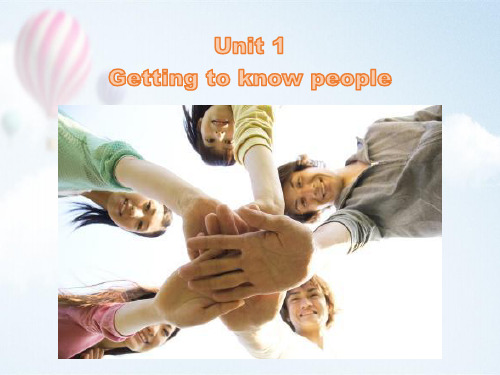
1999
Harry Potter and the Goblet of Fire
2000
Harry Potter and the Order of the Phoenix
2003
New Words
agent
n.
agency
n.
sensation
n.
staff
n.
client
n.
occupation n.
3. The teacher calls his student ____B__. A. Daffodil B. Diana C. Daisy
Part 2 Nice to Meet You.
1. What is the woman’s first name?
A. Andrew.
B. Andrea.
Family Name/Surname: G__ro__b_a_n___ First Name: _M_e_r_y_l____
Occupation: _a_c__tr_e_s_s__
Part 4 Get to Know People.
Passage 1
Example: Ms. Jaramillo’s first name is Inez. 1. Ms. Jaramillo is from Colombia. 2. Ms. Jaramillo likes Bogota. 3. Ms. Jaramillo lives in a house. 4. Ms. Jaramillo has two sisters. 5. Ms. Jaramillo’s friends are Colombian.
attendant
n.
surname
实用综合教程1-Unit_2__课后答案
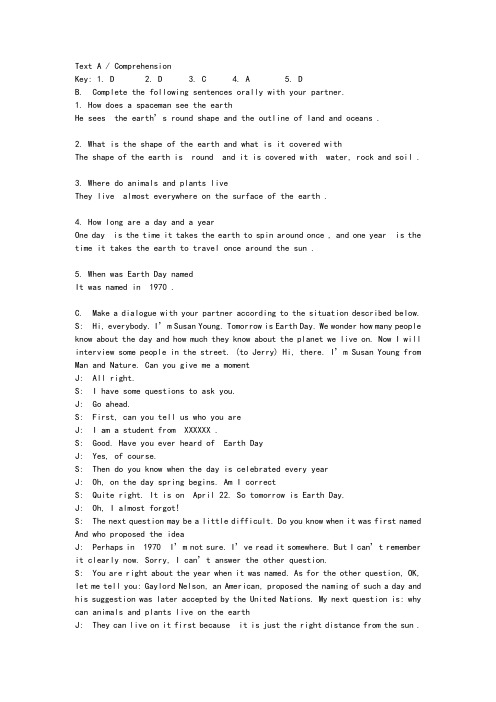
Text A / ComprehensionKey: 1. D 2. D 3. C 4. A 5. DB. Complete the following sentences orally with your partner.1. How does a spaceman see the earthHe sees the earth’s round shape and the outline of land and oceans .2. What is the shape of the earth and what is it covered withThe shape of the earth is round and it is covered with water, rock and soil .3. Where do animals and plants liveThey live almost everywhere on the surface of the earth .4. How long are a day and a yearOne day is the time it takes the earth to spin around once , and one year is the time it takes the earth to travel once around the sun .5. When was Earth Day namedIt was named in 1970 .C. Make a dialogue with your partner according to the situation described below. S: Hi, everybody. I’m Susan Young. Tomorrow is Earth Day. We wonder how many people know about the day and how much they know about the planet we live on. Now I will interview some people in the street. (to Jerry) Hi, there. I’m Susan Young from Man and Nature. Can you give me a momentJ: All right.S: I have some questions to ask you.J: Go ahead.S: First, can you tell us who you areJ: I am a student from XXXXXX .S: Good. Have you ever heard of Earth DayJ: Yes, of course.S: Then do you know when the day is celebrated every yearJ: Oh, on the day spring begins. Am I correctS: Quite right. It is on April 22. So tomorrow is Earth Day.J: Oh, I almost forgot!S: The next question may be a little difficult. Do you know when it was first named And who proposed the ideaJ: Perhaps in 1970 I’m not sure. I’ve read it somewhere. But I can’t remember it clearly now. Sorry, I can’t answer the other question.S: You are right about the year when it was named. As for the other question, OK, let me tell you: Gaylord Nelson, an American, proposed the naming of such a day and his suggestion was later accepted by the United Nations. My next question is: why can animals and plants live on the earthJ: They can live on it first because it is just the right distance from the sun .Living things need the sun’s warmth and light for life. They also must have enoughwater to live. The earth has plenty of water that covers most of its surface .S: The last question: what lies at the center of the earthJ: A ball of hard metal lies at the center of the earth.S: Very good. I think you know a lot about our mother earth. Thank you for yourtime.J: You are welcome. I’m glad to have taken part in your program. And I like yourprogram very much .S: Thank you again! Goodbye!J: Bye!Vocabulary Building / ExercisesA. Match each word with its proper Chinese meaning.B. Fill in each blank with a given word or expression in their right form.form include at the center of call(one’s) attention toprotect as far as surface measure1. I’ll help you as far as I can.2. He had included a large number of funny stories in the speech.3. These greenbelts protected / protect / have protected 500,000 acres of farmlandagainst moving sands.4. The TV program is shown to call people’s attention to water pollution in China.5. A soft wind caused ripples on the surface of the lake.6. The children formed / have formed a circle around her.7. My mother measured / has measured / is measuring me for a new dress.8. The park lies at the center of the city.Grammar Tips / ExercisesA. Fill in each blank with a proper preposition.1. He asked me whether the movie was based on a real story.2. The Beckhams traveled around China in 2011.3. You can look up the word in the dictionary.4. — Where are good potatoes grown— Good potatoes are grown in North China.5. —What’s thi s bottle made of—It’s made of china.6. We are busy preparing for the exam.7. A new bridge is built over the river.8. He came into the classroom with a book in his hand.9. There is a lamp between the bed and the desk.10. Autumn is the best season of the year in Beijing.B. Complete each sentence with one of the prepositions given in brackets.1. The two countries are at war. (at / about / with)2. The rain was beating against the windows. (in / against / at)3. The train is ten minutes behind time. (behind / after / before)4. There are many other people besides Tom at the party. (but / beside /besides)5. Who is he after (after / before / in)6. The policeman caught the thief by the arm. (at / by / with)7. The ball fell to the ground. (to / in / over)8. I am here only on business and I’ll leave soon. (under / on / with)9. There is a map of China on the wall. (for / like / of)10. Ten years passed and his son has grown into a young man. (like / into / to)C. Fill in each blank according to the Chinese given in brackets.1. She left the manager’s office with tears (哭着).2. The boat sails on / down / along the river (河上).3. The manger will come back in a week (一周内).4. Christmas is celebrated in all (of) the Western countries (所有西方国家).5. We held an interesting party in the open air (在户外).Text B / ComprehensionA. Answer the questions according to the text.1. What is Earth Day aboutKey: It is about learning about and protecting the biodiversity on earth.2. Who is the founder of Earth DayKey: The founder is Gaylord Nelson of the United States.3. How do people traditionally celebrate Earth DayKey: They traditionally celebrate the day with the ringing of bells, often bells of peace.4. What did Australians do on Earth Day to draw attention to air pollution Key: They organized a large “carless” day.5. What have been the themes of China’s Earth DayKey: Protection of geographic relics and scientific development and sustainable use of naturalresources in China and all over the world.B. Read the sentences below and decide if they are true or false according to thetext. Write T for true or F for false.1. When Earth Day was founded, it was only celebrated in the US.2. In 1972 Earth Day was made an international celebration by the UN.3. Earth Day reminds people of their responsibility for the common planet they share.4. The ringing of peace bells on Earth Day is practiced only in the West.5. In Kenya children plant trees on every Earth Day.Key: 1. T 2. F 3. T 4. F 5. FComprehensive ExercisesA. Choose the best answer.(C)1. ________ the help of the guide dog, the old man ________ his son a visit.A. Under; spentB. With; tookC. With; paidD. Under; showed(A)2. Because ________ bad weather we had to have our physical education class in the classroom.A. ofB. it wasC. of theD. the(C)3. I often dream ________ my old friends.A. to seeB. seeingC. of seeingD. at seeing(C)4. ________ the end they succeeded in finishing the task ________ the end of June.A. At; atB. In; inC. In; atD. At; in(C)5. Can you translate the passage ________ EnglishA. withB. fromC. intoD. by(D)6. We couldn’t help ________ when we heard the hero’s story.A. movingB. to moveC. to be movedD. being moved(A)7. Please pay twenty dollars for these, the dictionary ________.A. includedB. were includedC. includeD. including(A)8. When he became a famous poet he was ________ his early thirties.A. inB. atC. afterD. from(D)9. You ________ not smoke here. This is a public place.A. could betterB. would betterC. should betterD. had better(D)10. The teacher shared the tasks ________ all the children in her class.A. toB. withC. byD. amongB. Fill in the blanks with the words given below.right March long people spring thanWhat and When Is Earth DayWhen I proposed to name Earth Day, a global occasion to celebrate the wonder of life on our planet, I thought long and hard about what day to choose. It must be meaningful and must be accepted by people . When I came across the Vernal Equinox (春分), I immediately knew it was right . What could be better than the first day of spring when hearts and minds can join together with thoughts of peace and the awakening of the earth. So the first Earth Day was celebrated in San Francisco, on March 21, 1970. The United Nations later accepted the day as a yearly event for people all over the world. Each year the United Nations Peace Bell rings at the moment spring begins.C. Translate the following sentences into English, using the given words or phrases.1. 就我们所知,地球是人类可以居住的唯一星球。
大学英语综合教程第一册Unit 2课后练习答案
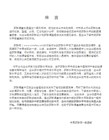
5) The cost of equipping the new hospital was estimated at $2 million.
4) The author got to learn more about their friendship by reading the letter himself.
2.
Parts Paragraphs Main Ideas Part One Paras 1-20 From a conversation with the cab driver the author learned how much he regretted failing to keep up correspondence with his old friend Ed. Part Two Paras 21-35 Reading the letter by himself, the author learned more about the lifelong friendship between the driver and Old Ed. Part Three Para 36 The driver's experience urged the author to reach for his pen.
3. 1) A couple of flights at Pudong Airport were postponed this morning because of the awful weather. It is estimated that over one thousand passengers were held up.
全新版大学英语综合教程1第2单元ppt课件
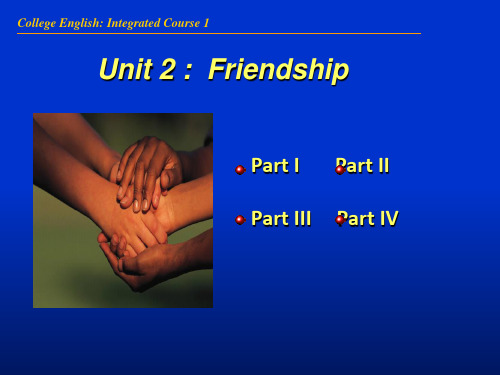
more index previous next back break over
Unit 2:Friendship
Part II: Text A Vocabulary to read p1. He must have been…
p2. “I’m in no hurry… p3. Then, estimating that he was… p4. “I don’t think any of us… p5. “All the way through high … p6. “Actually,” the driver went on… p7. “I’m sorry,” I said.… P8. “Well,” I agreed, “we should … P9. “Thanks,” I said, “but I… P10. and the first sentence …
Content questions Text Organization
Language Sense Enhancement
Poetry Quotations Humorous story
Language Focus
Movie Web-links
1.Vocabulary Dictation Gaps Filling
index back break over
Unit 2:Friendship
NCE-B1
Dionne Warwick is one of the most popular and recognizable personalities and voices in music since the early sixties. She continues to enjoy a phenomenally successful and diverse career on record, in concert, on television, and now as the host of a nationally-syndicated radio show.
综合教程1 Unit 2 Whatever Happened to Manners
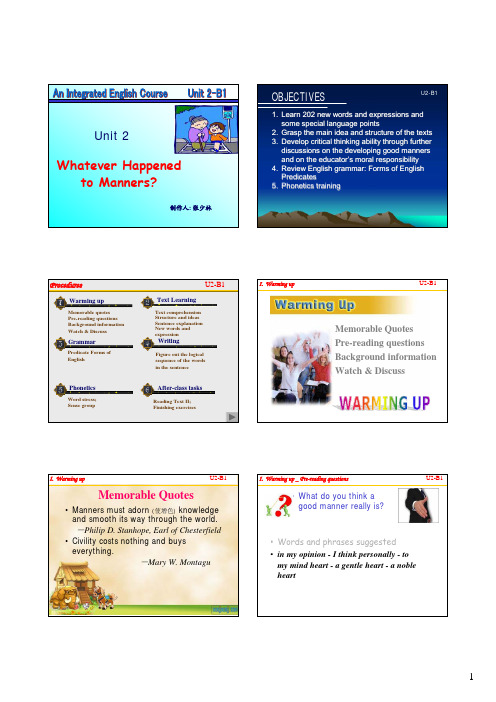
Unit 2Whatever Happenedto Manners?制作人: 张少林OBJECTIVES1.Learn 202 new words and expressions and some special language points2.Grasp the main idea and structure of the texts3.Develop critical thinking ability through further discussions on the developing good manners and on the educator ’s moral responsibility4.Review English grammar: Forms of English Predicates5.Phonetics trainingU2-B1Memorable quotes Watch & DiscussWarming upPredicate Forms of EnglishGrammarWord stress;Sense groupPhoneticsText comprehension expressionText LearningFigure out the logical WritingReading Text II; Finishing exercisesAfter-class tasksMemorable Quotes Pre-reading questions Background information Watch & DiscussI. Warming up U2-B1Memorable Quotes•Manners must adorn (使增色)knowledge and smooth its way through the world.―Philip D. Stanhope, Earl of Chesterfield •Civility costs nothing and buys everything.―Mary W. MontaguI. Warming up U2-B1•I.Warming up_Background information U2-B1Carry-on bag (Para.6)•A bag small or compactenough to be carried aboardan airplane by a passenger.II. Text learning U2-B1 Snickers is a chocolate bar made II. TextLearningType of writing :ArgumentationTheme :Necessity and significance of good manners.Characteristics:the ingenious use of a variety of sentences as well as of proper words and phrases. Some metaphorical expressions are employed to bring out the nice effects and create wonderful images of good manners.Example 1: Some people rush into elevators without giving those inside a chance to get off first.1. What example does the author cite in the first paragraph to support his ideathat people are not behaving as politely as they used to?Example 3: Some people never give a wave or nod of appreciation whenanother motorist lets them pull out into traffic.Example 2: Some people never say “Thank you.”when others hold a door open for them, or “Please.”when they want a coworker hand them something.II. Text learning _ Text comprehension U2-B1 2. What could a gracious manner probably bring about according to the author? (Para.4)•It could not only sets an excellent example for your children and grandchildren but it adds priceless panache to your image.II. Text learning _ Text comprehension U2-B13. What made the author feel all the more appreciative of a thank-you note? (Para.5)•That the guest had also included a recipe for a dish the author had complimented her on at an earlier gathering made the author feel all the more appreciative.II. Text learning _ Text comprehension U2-B1•It is the simple phrase "Excuse me."4. What phrase does the author think is just as powerful as a thank-you note? (Para.7)II. Text learning _ Text comprehension U2-B15. Why is it so important to use good manners with our own families?•It is because to use good manners with our own families counts the most, for those are the people we love the most.6. In what way is it true that goodmanners are infectious according to the author? (Para.11)•The author wishes good manners would infect one another so as to let everyone possess them.7. Do you agree that good manners are a sort of hidden beauty secret? Justify your answer.•Yes, I do. I agree that the kindest, most generous people seem to be better-looking and show a better imagebecause their kindness and generosity add a great deal to their image.II. Text learning _ Text comprehension U2-B1•For example, American millionaires and billionaires follow the American tradition and donate half of their wealth to charities and public education. They show a better image than otherwise.•Also, I quite agree with the author that like wearing a little lipstick or making sure your hair is neat, getting into the habit of saying "Thank you." can make you feel better about yourself, and then you look better to everyone around you.II. Text learning _ Text comprehension U2-B1Structure of the Text•Part 1: Paragraph 1•Part 2: Paragraphs 2-4•Part 3: Paragraphs 5-10•Part 4: Paragraph 11II. Text learning _ Structure of the text U2-B1•The essay is organized chiefly by means of the following method:•1. The main idea is used as the main framework of the text;•2. The deductive method is employed in most of the paragraphs;•3. The writer’s experiences and some typical examples are made good use of as convincing evidence;•4. Some key phrases, each of which stands in a single line, are used as subtitles;•In the beginning part, the writer puts forward his viewpoint: nowadays, many people show a lack of good manners; they are less friendly or less polite than people in the past. Then he illustrates his viewpoint with specific examples he witnesses in New York.•In the next three paragraphs, the writer raises and proves his opinion : good manners are a sort of hidden beauty secret; your good manners make you feel better and look better, contributing to building up your nice image.•From Paragraph 5 to Paragraph 10, the writer points out and illustrates the favorable influence of some specific good manners on the receivers.•In the last paragraph the writer concludes that good manners areinfectious; meanwhile, he expresses his sincere wish for a polite society where everybody would behave politely.II. Text learning _ Structure of the text U2-B1Let’s listen to and read Part 1 of the text(Para.1)Part 1II. Text learning _ Part 1 U2-B1Main Idea of Part 1II. Text learning _ Part 1 U2-B1In this part the writer states and proves that many people in present times are not as polite as people in the past. He convincingly illustrates this social phenomenon with specific impolite manners he sees in New York.Do you remember a time when people were a little nicer, a little softer, a little gentler with each other? I certainly do, and I feel that much of the world has somehow gotten away from that. (L1, Para.1)II. Text learning _ Part 1 U2-B1What does this sentence imply?It implies that in a general sense, people in the present age are less gentle, less friendly or less polite than people in the past?•What does the word that refer to?It refers to a time when people were a little nicer, a little softer, a little gentler with each other.II. Text learning _ Part 1 U2-B1•I feel that much of the world has somehow gotten away from that. ( L2, Para.1)I feel that many people in the contemporary world are, for some reason or other, not as nice, not as friendly, or not as polite with one another as people in the past.somehow ad .in a way not specified, understood, or known; trying to e.g.She somehow got lost .她不知道怎么竟迷了路。
- 1、下载文档前请自行甄别文档内容的完整性,平台不提供额外的编辑、内容补充、找答案等附加服务。
- 2、"仅部分预览"的文档,不可在线预览部分如存在完整性等问题,可反馈申请退款(可完整预览的文档不适用该条件!)。
- 3、如文档侵犯您的权益,请联系客服反馈,我们会尽快为您处理(人工客服工作时间:9:00-18:30)。
Conversation 1
Notes:
Hi, folks: an informal way of greeting a group of people
Part 1 Communicative Activities
Conversation 1
Read and study the conversation. Which short sentences will be useful in everyday informal conversation? Underline them and then compare them with your classmates.
words: house, home, and apartment
Listening 2 1.What is their traditional house like?
Listening 2
2.Draw a picture in the box below that fits the couple’s description.
Listening 2
3.What is the function of the wall in front of the gate according to the local tradition?
Listening 2
4.Discuss the differences between three words: house, home, and apartment
Listening 1
Listening 1
Now, two students Tom and Barry are shown around by the house manager. Listen and name the different parts of the apartment.
Listening 1
Corner, you introduce yourself to your foreign teacher, and introduce your best friend to him.
Listening 1
Work in pairs and try to name the different parts in the following floor plan of a student’s apartment
Talking about privacy and individualism
Talking about buying and selling houses
How to introduce?
Introduction
You may introduce yourself like this: -Good morning, Mrs. Black, allow me to introduce myself. My name is Jane. -Let me introduce myself. My name is Mary Brown. -I don't believe we've met. I'm Li Zheng. -Glad to meet you. I'm Catharine Black. -It's Catharine, but please call me Kate. -Hi. I'm John. I'm a new comer.
What is your apartment like? Describe it on the blackboard.
Listening 2
Listen and complete the task 1.What is their traditional house like? 2.Draw a picture in the box below that fits
sort out: to select from others; to arrange (the letter), to put into good order
You’re joking: a colloquial expression to show one’s doubt
return address: the sender’s address printed/written in the top left corner of an envelope.
Listening 1
Answer the following questions:
Where are the facilities located in this apartment?
If they want to save power, what should they do about the thermostat?
The three words are often confusing. e.g. Please come to my home for a dinner. (In fact the speaker and his family are living in an apartment in the city.) Therefore, it is more appropriate to say in this case “Please come to my apartment for a dinner.” A house is a building in which people live, usually the people belonging to one family. Someone's home is the house or flat where one lives. Home is most often used to refer to the social unit formed by a family living together. An apartment is a set of rooms for living in, usually on one floor of a large building. (mainly AM; in BRIT, use flat)
Unit Two American Homes and Traditional Chinese Homes
Learning Objectives
Talking about introducing people and places
Talking about housing and layout of rooms/houses
6. He will be away from __h_o_m__e____ for two weeks.
a place one usually lives as his residence
7. He works or studies at ____h_o_m__e_______.
at the place where he lives, works or studies comfortably
3. The American student went to see Lili’s parents’ __h_o_u_s__e___ in the village.
She is to see what the residence is like in the village.
4. They have a second __h__o_m__e___ on the lake.
the couple’s description. 3.What is the function of the wall in front of
the gate according to the local tradition? 4.Discuss the differences between three
2. Would you like to come to my ___h_o_u__s_e__ for a dinner? We live in the block just next to the train station.
a physical location for eating, not a place for the guest to live as home
Common Answers:
Nice to meet you, Jane. How do you do, Mrs. Brown? Pleased to meet you. Hello! Glad to meet you. It's nice to meet you. It's a pleasure to know you. Hi!
You bet…: an emphatic way of saying “certainly”.
Conversation 1
Return address
Conversation 1
Cultural Information
financial aid :money given or lent to students at college or university to pay for their education(经济资助)
You may introduce people like this:
-May I introduce you to Mrs. White, my English teacher? Mrs. White, this is Mrs. Brown.
-I'd like you to meet Jane. -This is Liu, the manager of our department. -Meet my friend Bai Mei. -Hi, John, this is Jane. Jane, this is John.
